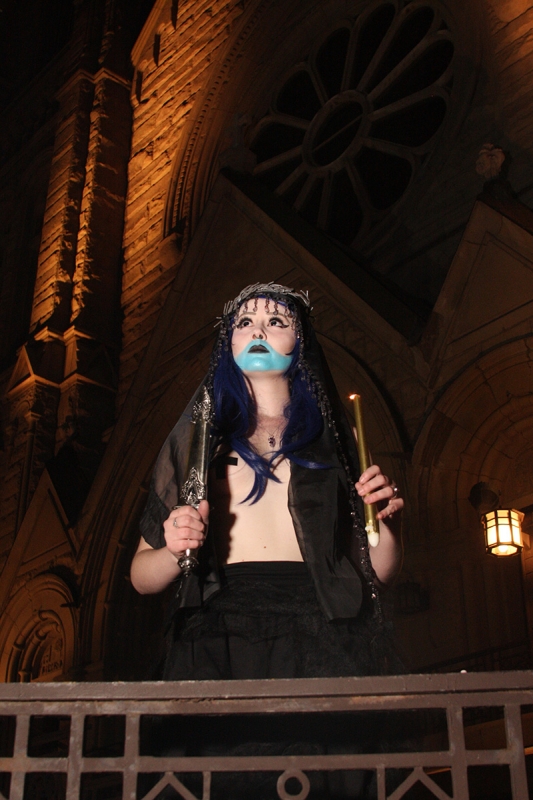Creature Feature: Ladie Lilith – Smashing Gender Expectation
Art

Salt Lake’s Bad Kids Collective, born from Club-Kid/Gaga fever dreams, Internet-embellished lifestyles and queer performance attitudes, has galvanized Utah drag culture in recent years. The Bad Kids, part autonomous happenings of human bodies, part multi-media selfie-installations, are cultivating a community of gender performance in Salt Lake where diverse expression reigns, where talent refers not to exclusive abilities, but rather the courage to get onstage and perform one’s artistic vision to completion. For them, every day is drag, every body a context to apply with costume, cosmetics and ontological anarchism.
SLUG spoke with Ladie Lilith about theater, gender performance, fluidity and her/his year with the Bad Kids.
Lilith, who is gender fluid and prefers female or male pronouns over the plural “they,” depending on how she/he identifies at any given moment, came to the Bad Kids Collective about a year ago by way of her/his friend Jezebel Jet, a fellow performer. Having acted since she/he was eight years old, Lilith found the stage that the Bad Kids were cultivating quite inviting.
Lilith’s name and much of her/his character’s imagery stems from a religious upbringing. She/he takes the name from Lilith, Adam’s original wife according to Jewish mythology, who refused to be submissive. “She’s this strong, dominant female character in mythology,” says Lilith. “Even though she’s a beautiful character, she’s been demonized by patriarchy. She refused to obey him and wanted to be her own person, be really independent.” Lilith also incorporates the imagery of the Virgin Mary into her persona: “I try to bring her out and give her the sexuality that she’s never been given.”
Despite her/his upbringing in theater, Lilith was unsure about where to begin with drag. “When I started doing drag, I was like, ‘I don’t know if I can really do this,’ because everyone was so focused on the make-up and the hair and the costumes, whereas for me, I’m not really focused on that.” She/he says that for Lilith, it’s about concepts, not costume. “When we all sit down and we brainstorm what we want to do, there’s a couple of people in the group who’d be like, ‘Oh I love this make-up or this costume or this song.’ For me, it’s like, ‘did you hear about this thing that just happened in the news? Did you hear about this concept in gender studies,’ and then I think, ‘How can I convey that visually?’ And then I add the costumes, the song, and it kind of just comes together.” Once the concept is fleshed out, Lilith painstakingly rehearses her performances. “I’ll write out every second of the song, I’ll rehearse it for hours,” she/he says.
Though Lilith interprets traditionally female characters, and she/he has only performed as a female on stage, her/his character also explores gender fluidity and spirituality through complex, personal themes. “I would wake up on a day-to-day basis and feel like I was on a totally opposite side of the spectrum,” she/he says. “I’d wake up one day and be like, ‘I’m totally a boy.’ I’d dress like a guy and I’d act like a guy. I always wanted to be one of the boys, but I was told, ‘No, you’re a woman.’” The older Lilith became, the more she dis-identified with being cisgender. “I was getting cast into roles that were very feminine, and it bothered me,” she/he says. “I didn’t understand why until I took a queer theory class with [University of Utah Professor] Kathryn Stockton. Your gender can change by the minute.” Lilith has been able to accept her fluid identity, but it’s still a difficult idea to convey to those who aren’t understanding of it. (In this regard, don’t call Lilith a “Bio-Queen.”)
Lilith describes her/his performance style as gory and raw. “I enjoy that my art makes people talk,” she/he says, likening her performance to political theater. One visceral example was when she smashed a model LDS Temple on stage at Metro Bar, which elicited strong responses—both complimentary and derogatory—from onlookers. Such performances are cathartic for Lilith. “It took a lot of pain and a lot of me being silent to say, ‘You know what, I’m fucking done. I’m finished with this and I’m going to be this persona.’”
In addition to gender performance, Lilith, writes poetry, fiction and creative nonfiction and works in theater. “A lot of my art stems from the gender studies writing that I do,” she/he says. For one performance, she/he took the stage alongside Jezebel Jet; the pair were dressed as beauty pageant queens, wearing sashes that read “Miss Andry” and “Miss Ogyny.” Lilith’s creative approach is to blend her media for a wider artistic reach. “Writing and English doesn’t have to stay on a page,” she/he explains. “You can express it visually through stage performance. I think it’s important that people find their voice somehow, mine just happens to be through drag.”
Ladie Lilith performs regularly with the Bad Kids Collective. Find out more about them here.








